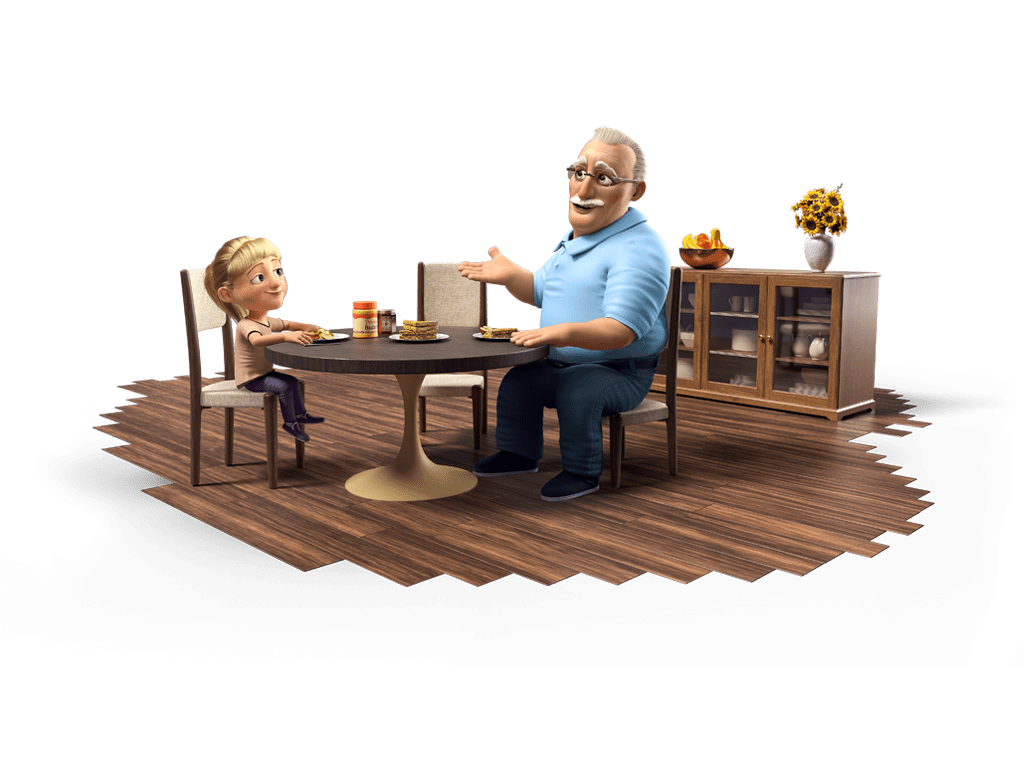
A balanced diet is good for your health and can be an
important factor as you move forward with liver cancer
Diet plays an important role in many types of cancer. Liver cancer, in particular, may cause symptoms that affect
your eating habits. You may also experience side effects related to your liver cancer treatment, such as nausea.
Liver cancer is complex. It can be thought of as a disease within a disease. This is because some people already have liver conditions
before the diagnosis of liver cancer, such as nonalcoholic fatty liver disease (NAFLD) or nonalcoholic steatohepatitis (NASH). If you
had NASH or NAFLD, before your liver cancer diagnosis, you may already be choosing and eating certain foods to help with these
conditions. Now, with liver cancer and its treatments, you may want to find even more ways to adjust your diet and pay attention to
the foods you choose.
When you’re not feeling well because of cancer or its treatments, it may be difficult to shop for food or prepare
and eat regular meals. If you’re looking for help with shopping or making meals, the following services can help:
*May not be available in every state or region.
Liver-healthy foods to
think about
Foods that are good for you like vegetables, whole grains, fish, poultry, low-fat dairy products, certain nuts, and soy are also good for people with liver cancer. Explore Myplate.gov for more information about healthy food options.
Physicians and other healthcare providers agree that people with liver conditions should avoid alcoholic drinks.
Be sure to drink plenty of fluids to keep your body well hydrated. If you are receiving cancer treatment, you may be at higher risk for dehydration due to side effects.
When you grocery shop, one easy thing to remember is “shop the perimeter.” That means that the areas around the outer edges of most grocery stores are where you’ll find foods like meats, vegetables, fruits, and dairy products that are fresh and less processed, and therefore generally healthier.
There are lots of ways to personalize a food plan that’s just right for
you. Whenever possible, shopping in areas at the outer edges of a
grocery store is a helpful guide to selecting the healthiest foods
Antioxidants and other natural elements
Many scientists agree that antioxidants offer general health benefits. Antioxidants occur either as natural or man-made substances that
scientists and researchers suggest may prevent or delay some types of cell damage. While there is no evidence that liver cancer can be
cured by antioxidants or other natural supplements, diets high in vegetables and fruits, which are good sources of
antioxidants, have been found to be healthy for everyone. Examples of antioxidants include vitamins C and E, selenium, and
carotenoids, such as beta-carotene, lycopene, lutein, and zeaxanthin. If you’d like to know more about foods that contain
antioxidants, please visit the US Department of Agriculture’s Food and Nutrition Information Center. Always check with your
doctor before taking any prescription or over-the-counter antioxidants or supplements.
Take a look at other items you might enjoy
Black currants, plums, pomegranates, cruciferous vegetables (like cauliflower, broccoli,
watercress, or Brussels sprouts), french beans, tomatoes, asparagus, garlic, turmeric, ginger,
soy, rice, tea, coffee, chocolate, nuts, apples, berries, chives, leeks, and onions
You can make more nutritional choices now that can
help you feel better, regardless of your health status
Global Liver Initiative (GLI) is dedicated to providing support and information to people with liver diseases.
As part of that support, GLI offers a nutrition app which is scientifically based and designed to help you create
personalized meal plans. It’s important to keep in mind that the healthiest choices in diet and nutrition are backed by
science. Try this app for more information. Remember to consult with your healthcare team before making any dietary
changes.
Lifestyle changes you can make now
Living healthier is about more than just diet and nutrition. There are other lifestyle changes that healthcare
professionals generally agree can be good choices for everyone, including people living with liver cancer, such as increasing mental
well-being through meditation and yoga. Decreasing the use of tobacco and intake of alcohol are helpful for your overall health.
Getting some exercise is important
Walking, swimming, and biking are low-impact recreational exercises that you might want to try with friends,
family, or on your own. Physicians and researchers recognize the mental and physical benefits of exercise for
people living with cancer. Moderate exercise every day may:
Decrease fatigue and
help you sleep better

Decrease stress
Improve digestion and
decrease constipation
Increase your
appetite
Lift your mood and help
you feel better
Hobbies can be enjoyable, and relaxing, too.
Cancer and many of its treatments can make it more difficult to participate in some activities. During treatment you
may feel forgetful, find it difficult to focus, or that you aren't thinking as clearly as usual—this is called "brain fog."
During these times, you may find it helps to have a hobby or activity that is easy and calming.
Here is a range of activities you could choose from:
Moving
Dancing
Riding a bike
Light resistance
training
Water aerobics
Restorative
Tai Chi
Gentle yoga
Taking a walk and/
or walking a dog
Gardening
Quiet
Journaling
Knitting, crocheting,
or making quilts
Playing board
games
Listening to music or
playing an instrument
Painting or
photography
Origami or
woodworking
Reading and/or
listening to an audiobook or
podcast
Simply going outside
is a good way to lift
your mood
It’s never too late to start something new. Choose something you want to do. Remember to discuss any new
program or physical activities with your healthcare team.
Getting enough sleep may also help
Sometimes, when undergoing cancer treatment, falling asleep and staying asleep is more difficult
than normal. One reason for this is that having cancer can increase stress, which often
disrupts sleep. It’s also helpful to set a routine that you follow every night when preparing to go to bed.
That might include lowering lights and pulling down the sheets or covers. You will find
routines that work best for you. Here are a few tips that you can try to get a more restful night’s sleep.
Techniques
If you can't fall asleep right away, try to do something relaxing, like listening to quiet
music or reading. Some people find a warm glass of milk or a cup of decaffeinated tea
is helpful, too. Keeping your bedroom a little cooler, taking a warm bath or shower before
you go to bed, and meditating are other routines that you might choose to
follow. Additionally, there are several tools and techniques designed to help you to
sleep at night. Visit Managing Sleep Problems at the ACS—it's a good place to start learning.
Quiet
Keep the sleeping area quiet and comfortable. Silence helps you sleep. Use background
noise that is constant or soothing, such as a fan, to mask environmental noise you cannot control from neighbors or traffic.
Food
Try to finish eating at least 2 hours before you plan to go to bed. Some foods can make
it harder for you to fall asleep and stay asleep. Talk with your healthcare team about the
foods to avoid when you want to sleep.
Physical Activity
Getting enough physical activity during the day helps you sleep at night. Some people
may find exercising too close to bedtime can make it more difficult to fall asleep.
Relax Have a set time each day to talk with someone or to think over or write down the issues that worry you.
People living with liver cancer often experience fatigue, and napping can be an important way to
help address that feeling. Napping during the day is a good way to help restore your energy and get
the rest you need. If you feel like you’re tired and need to take a nap, find a quiet place where you
can lie down, rest, and sleep.










